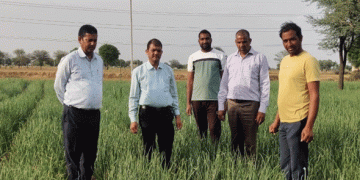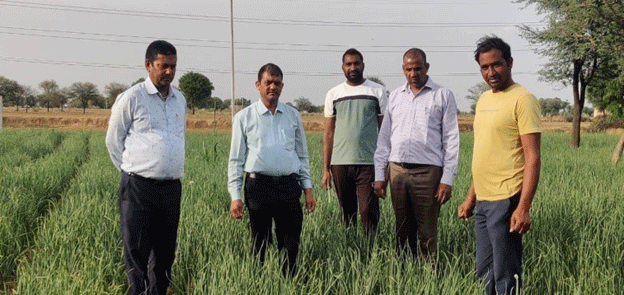Onion farming in India faces significant challenges, including low productivity, pest infestations, and environmental stresses, leading to reduced yields. The average yield in India hovers around 18 tons per hectare, well below global standards. However, a promising development has emerged in Rajasthan, where the Pusa Riddhi onion variety is yielding bumper harvests and providing farmers with substantial income boosts.
The Pusa Riddhi variety, introduced by the ICAR-Krishi Vigyan Kendra (KVK) in Chomu, Rajasthan, under the Tribal Sub-Plan (TSP) during the rabi season of 2023-24, has shown remarkable results. This onion variety stands out for its compact, flat-globe shape, dark red color, and high pungency, making it not only desirable in the local markets but also ideal for long-term storage and export.
Key Features of Pusa Riddhi:
- Size: Average bulb weight of 70 to 100 grams, with an equatorial diameter ranging from 4.8 to 6.3 cm.
- Nutritional Content: High in pungency and antioxidants, with a quercetin content of 107.42 mg/100 g.
- Storage and Export Potential: Excellent for long-term storage without loss of quality, making it highly exportable.
- Yield: An average yield of 32 tons per hectare, compared to the national average of 18 tons per hectare.
Farmers See Significant Benefits
The demonstration fields at Aachhojai village showed that the Pusa Riddhi variety could yield up to 33.5 tons per hectare, a 25–35% increase over local varieties. Farmers participating in this initiative reported several benefits:
- Higher Yields: A significant increase in the yield per hectare compared to traditional varieties.
- Better Market Value: Pusa Riddhi onions fetched higher prices due to their superior quality.
- Storage Capability: The onions stored for longer periods without quality loss, reducing the pressure to sell immediately after harvest.
The financial benefits were also substantial. Farmers earned between ₹25,000 to ₹30,000 per bigha (about 1,000 square meters), and the benefit-cost ratio (BCR) ranged from 2.5 to 3.5, signaling a highly profitable venture. This success has led to a growing demand for Pusa Riddhi, with farmers eager to adopt it in upcoming seasons.
The Role of ICAR-KVK and Capacity Building
ICAR-KVK Chomu played a pivotal role in the success of this initiative by providing hands-on training to farmers. These training sessions focused on best agricultural practices, including crop management, pest control, and effective storage techniques. Regular field visits helped farmers stay updated on the latest practices, ensuring optimal cultivation and post-harvest handling of the crop.
A Bright Future for Onion Farmers
The Pusa Riddhi variety has revolutionized onion farming in Rajasthan, particularly for small-scale farmers. With significantly higher yields, better market prices, and improved storability, this variety is not only increasing farmers’ income but also contributing to the economic stability of rural regions. As demand for this variety grows, it stands as a shining example of how agricultural interventions, backed by training and technology, can improve the productivity and profitability of farmers, ensuring their long-term sustainability.































